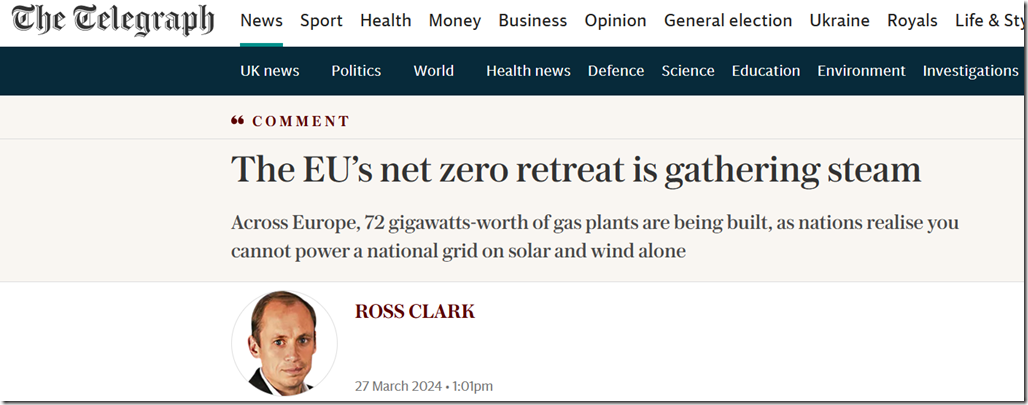MARCH 28, 2024By Paul Homewood
Building new gas power plants will, of course, “only make the transition to renewables-based power unnecessarily costly”. How do I know? Because I heard it from a bunch of climate activists calling themselves Beyond Fossil Fuels. What’s more, building new gas plants runs contrary to the “emerging consensus” that Europe must phase out all fossil fuel-generation of power by 2035.
I’m used to activists making sweeping assertions and talking in generalities rather than addressing the boring old details like how we keep the lights on when there is little in the way of wind and solar energy on offer, but this really does take the biscuit. Only a “consensus” of climate activists with their heads in the clouds – plus Ed Miliband – thinks we could save consumers money by closing down all our gas power plants in the near future. Judge European governments by their actions rather than their words and the clear consensus is that we are very much going to need gas power in the future. As Beyond Fossil Fuels itself reveals, Britain is not the only country that is building new gas plants. Across Europe, 72 gigawatts-worth of them are being planned. This may well be contrary to the targets governments have set themselves to decarbonise their power sectors, but when forced to make a choice between virtue-signalling and keeping the lights on they are invariably choosing the latter.
It ought to be obvious that you cannot construct a national grid on solar and wind power alone. Renewables are great on a sunny, windy day like today when wind and solar farms between them are generating 21 gigawatts of power. It is rather less good on calm winter evenings when they can struggle to generate 1 gigawatt. What makes it possible to incorporate so much wind and solar power in our energy mix is gas power plants, which can be turned up or down at short notice to balance variable and unpredictable renewable power.
Only a “consensus” of climate activists with their heads in the clouds – plus Ed Miliband – thinks we could save consumers money by closing down all our gas power plants in the near future
Take gas away and you have a serious problem. We could store energy in lithium batteries or pumped storage reservoirs – but at a very high cost. We could theoretically use surplus power to generate hydrogen via electrolysis of water, store the hydrogen in underground caverns and burn it to generate power on windless and sunless days – except that the technology doesn’t yet exist on a commercial scale and when it does it is likely to be as expensive, if not more so, than lithium batteries. It certainly won’t be saving consumers money.
Rather than seeing gas a great evil, green lobbyists should see it for what it is: part of a system which has allowed us hugely to reduce carbon emissions from power generation over the past three decades. It has enabled us to all-but banish coal power plants – a form of energy which, gigawatt for gigawatt, produces around twice as many carbon emissions. And it has enabled the rollout of wind and solar by providing reliable back-up. Moreover, it may be possible in future to fit gas plants with carbon capture technology – although that won’t be cheap, either.
Green lobbyists are making themselves an irrelevance by turning against all fossil fuels in all circumstances. Governments may have nodded along with their demands up until now, by setting net zero targets. But clearly, when ideology collides with reality, governments are not going to sacrifice the well-being of their citizens. The move to build new gas plants is yet one more sign of Europe’s retreat from unrealistic net zero targets.
https://www.telegraph.co.uk/news/2024/03/27/europes-net-zero-retreat-is-gathering-steam/
- Forums
- Political Debate
- Accelerate the World's Transition to Sustainable Energy - to fight Anthropogenic Climate Change
MARCH 28, 2024By Paul Homewood Building new gas power plants...
- There are more pages in this discussion • 1,239 more messages in this thread...
You’re viewing a single post only. To view the entire thread just sign in or Join Now (FREE)










